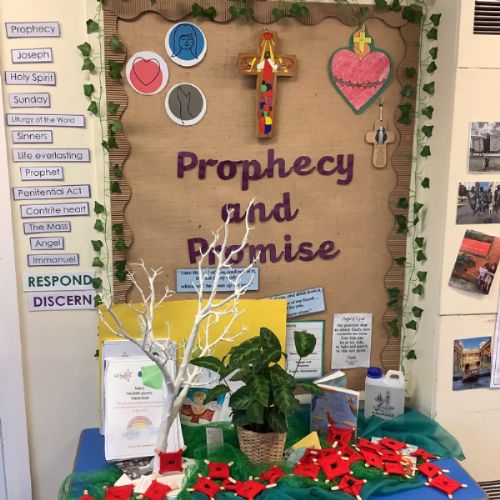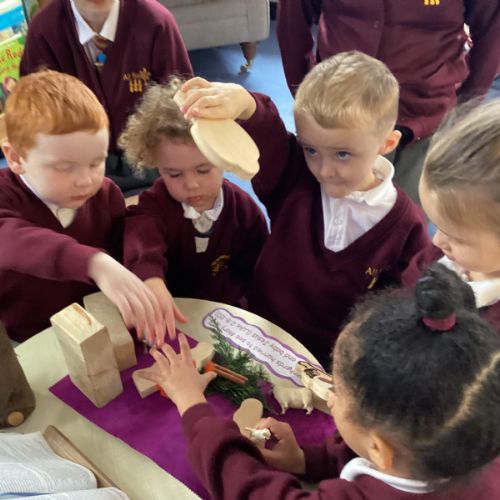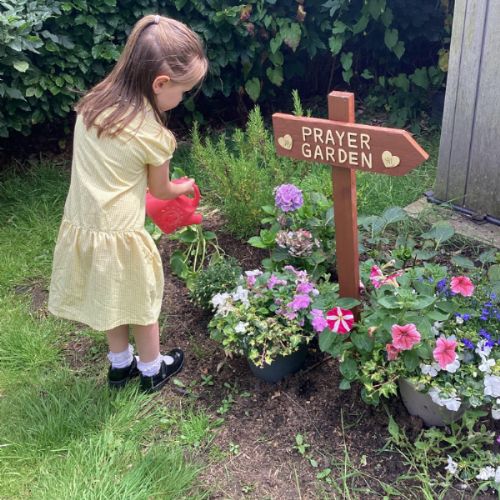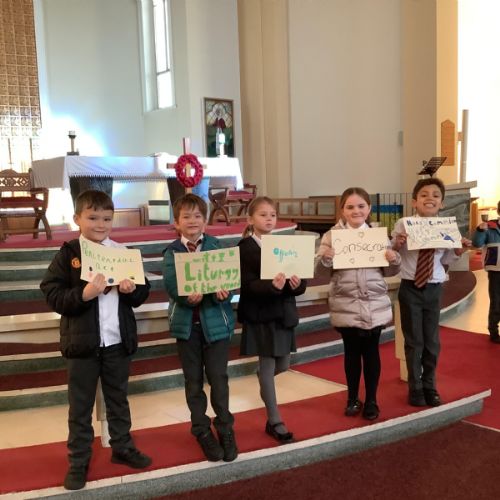Religious Education
"To Know You More Clearly."
"Education is not about knowing things or taking lessons but about being able to use three lingos: those of the head, the heart, and the hands... learning so that you can think about what you feel and do, can feel what you think and do, and can do what you feel and think. Unity within a person."
– Pope Francis
The Aims of Religious Education
· At All Saints’, we understand Religious Education to be the systematic study of the mystery of God, of the life and teachings of Jesus Christ, the teachings of the Church, the central beliefs that Catholics hold, the basis for them and the relationship between faith and life;
· to enable pupils continually to deepen their religious and theological understanding and be able to communicate this effectively;
· to present an authentic vision of the Church’s moral and social teaching to provide pupils with a sure guide for living and the tools to critically engage with contemporary culture and society;
· to give pupils an understanding of the religions and worldviews present in the world today and the skills to engage in respectful and fruitful dialogue with those whose worldviews differ from their own;
· to develop the critical faculties of pupils so to bring clarity to the relationship between faith and life, and between faith and culture;
· to stimulate pupils’ imagination and provoke a desire for personal meaning as revealed in the truth of the Catholic faith;
· to enable pupils to relate the knowledge gained through religious education to their understanding of other subjects in the curriculum

Intent
Why do we teach this? Why do we teach it the way we do?
At All Saints', Religious Education is central to our vision of “Living our Faith, Learning in Love.” We aim to provide the very best Catholic education for our pupils and to nurture each child’s spiritual growth, helping them to develop a personal relationship with God and live out the teachings of Jesus in their daily lives. Inspired by John 13:34 – “Love one another as I have loved you” – we encourage children to show kindness, respect and compassion to all. Through high-quality RE teaching, worship, and reflection, we celebrate our uniqueness and shared calling, echoing the words of Mother Teresa: “I can do things you cannot, you can do things I cannot, together we can do great things.” In this way, our RE curriculum helps children grow in faith, flourish in love, and contribute meaningfully to the world around them.
We aim to celebrate the uniqueness of every child, enabling each to reach his or her potential spiritually, morally, academically and socially. Religious Education is the core of the core curriculum. We aspire to achieve this aim through the everyday routine and prayer life of the school, as well as Religious Education and to achieve high standards and encourage pupils to make the most of the opportunities we offer them.
Implementation: Planning, Teaching and Learning
What do we teach? What does this look like?
Our curriculum is shaped by our school mission and values.
We ensure that a minimum of 10% of curriculum time is allocated for RE teaching across all key stages. At All Saints' Religious Education is carefully planned and delivered to reflect our deep commitment to nurturing faith, love, and understanding in every child. Our teaching is rooted in the RED (Religious Education Directory) and we have gradually introduced this through The Vine and the Branches scheme. As a school dedicated to shaping high-quality RE, we were proud to volunteer as a pilot school for the new RED scheme in 2023 in year groups one and three. This early involvement has enabled us to embed the curriculum with confidence, ensuring a rich, progressive and theologically sound RE experience. Planning is detailed and there is a sharp focus on knowing and understanding religious vocabulary. Teaching ensures that there are regular planned opportunities to re-visit, review and consolidate prior learning. In classrooms, you will see RE working walls displaying key vocabulary and current learning. There is a consistent approach to re-visiting learning from previous units throughout the school. Lessons are thoughtfully sequenced, incorporating scripture, liturgy, doctrine, and Catholic social teaching, while encouraging critical thinking, spiritual reflection, and active engagement with faith in action.
This academic year, all children will be taught using 'The Vine and Branches'.
The ways of knowing describe the skills that pupils develop as they progress through the religious education curriculum. We refer now to ways of knowing rather than standards or levels, since progress in religious education is not only something that concerns performance and summative assessment. They are called ways of knowing since they describe the holistic ways human beings experience education: as a growth in understanding, as a creative and critical assimilation, and as a recognition of the application of learning to one’s own life. The three ways of knowing are ‘understand’, ‘discern’, and ‘respond’.
Scripture is the foundation of each Branch and will develop knowledge, understanding, skills, compassion and awe and wonder across the curriculum.
'The Vine and Branches' meets the requirements of the Religious Education Curriculum Directory set out by the Bishop’s Conference of England and Wales. The schemes provide the basis for teaching the doctrines of the Catholic Church. We ensure that this programme of study is enriched with a variety of activities that include drama, history, geography and art.
- RED To Know You More Clearly
- RED Whole School Curriculum Overview
- Pupils explore the religious dimensions of questions about life, dignity and purpose within the Catholic tradition. Links are made with the pupils’ own experiences and with other faith traditions.
We proudly proclaim our faith and invite all to join us on our journey, but we welcome children and families of other faiths to our community, and we learn about other faiths and cultures.
Throughout the year, we ensure that children learn about other faiths, religious celebrations and events. We enjoy inviting visitors to school so that children can learn to respect and understand other faiths and cultures.
Impact
Through their learning in Religious Education, our children develop the ability to make meaningful connections between their own lives, the lives of others in their community, and the wider world. They grow in understanding and respect for the diverse cultures, beliefs, and ways of life that shape our global society, and are able to communicate this understanding with empathy and confidence.
We regularly monitor and moderate RE teaching and learning across the school to ensure consistent progress in all year groups. Evidence of children's spiritual and theological development is not limited to written work; it is also expressed creatively through art, drama, discussion, and lived experiences. These varied expressions allow children to demonstrate their understanding in rich and personal ways.
Religious Education equips our pupils with a deeper awareness of how and why people choose to live according to their beliefs. It fosters a reflective and compassionate world view, rooted in Gospel values. Above all, we joyfully celebrate our learning and growth in faith together, as a school family.












